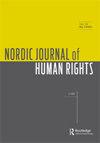秘鲁的遗产与人权:从考古世界遗产管理的视角
IF 1.2
Q3 POLITICAL SCIENCE
引用次数: 1
摘要
本文批判性地评价了秘鲁考古联合国教科文组织世界遗产管理的背景,并提出了基于人权的方法作为一个视角,可以使遗产实践出现问题,并提出了一个替代现状的框架。以人权为基础的做法被认为是在联合国政策范围内促进更公平做法的手段。通过对秘鲁遗产制度的分析,本研究显示了传统的以国家为基础的古迹保护优先管理如何产生了排斥的景观,但也造成了不同行动者权利之间令人不安的紧张关系。此外,报告还表明,对前殖民时期遗迹的过度保护,在历史上是遗产政策的中心,推迟了探索解决生活在考古遗址及其周围的当今社区权利的措施。我将通过对两个世界遗产案例的考察来说明这一点——Chan Chan考古建筑群和Qhapaq Ñan安第斯道路系统——它们代表了遗产管理的两种背景和方法。我认为,在秘鲁这样的背景下应用基于人权的方法,可以超越文化或遗产权利的辩论,成为关注经常被边缘化社区的一种工具。本文章由计算机程序翻译,如有差异,请以英文原文为准。
Unpacking Heritage and Human Rights in Peru: A View from Archaeological World Heritage Management
ABSTRACT This paper critically appraises the context of archaeological UNESCO World Heritage management in Peru and proposes human-rights-based approaches as a lens that can problematise heritage practice and suggest an alternative framework to the status quo. Human-rights-based approaches are considered as means to foster more equitable practices within UN policies. Through an analysis of the Peruvian heritage regime, this study shows how conventional state-based management prioritising monument conservation has produced landscapes of exclusion, but also uneasy tensions between the rights of different actors. Furthermore, it shows that the overprotection of pre-colonial remains, historically at the centre of heritage policies, have delayed the exploration of measures to address the rights of present-day communities living in and around archaeological sites. I will illustrate this through an examination of two World Heritage cases – the Chan Chan Archaeological Complex and the Qhapaq Ñan Andean Road System – which represent two contexts and approaches to heritage management. I argue that the application of human-rights-based approaches in a context like Peru may go beyond debates on cultural or heritage rights and serve as a tool for attending to communities that are often marginalised.
求助全文
通过发布文献求助,成功后即可免费获取论文全文。
去求助
来源期刊

Nordic Journal of Human Rights
POLITICAL SCIENCE-
CiteScore
1.00
自引率
25.00%
发文量
29
期刊介绍:
The Nordic Journal of Human Rights is the Nordic countries’ leading forum for analyses, debate and information about human rights. The Journal’s aim is to provide a cutting-edge forum for international academic critique and analysis in the field of human rights. The Journal takes a broad view of human rights, and wishes to publish high quality and cross-disciplinary analyses and comments on the past, current and future status of human rights for profound collective reflection. It was first issued in 1982 and is published by the Norwegian Centre for Human Rights at the University of Oslo in collaboration with Nordic research centres for human rights.
 求助内容:
求助内容: 应助结果提醒方式:
应助结果提醒方式:


